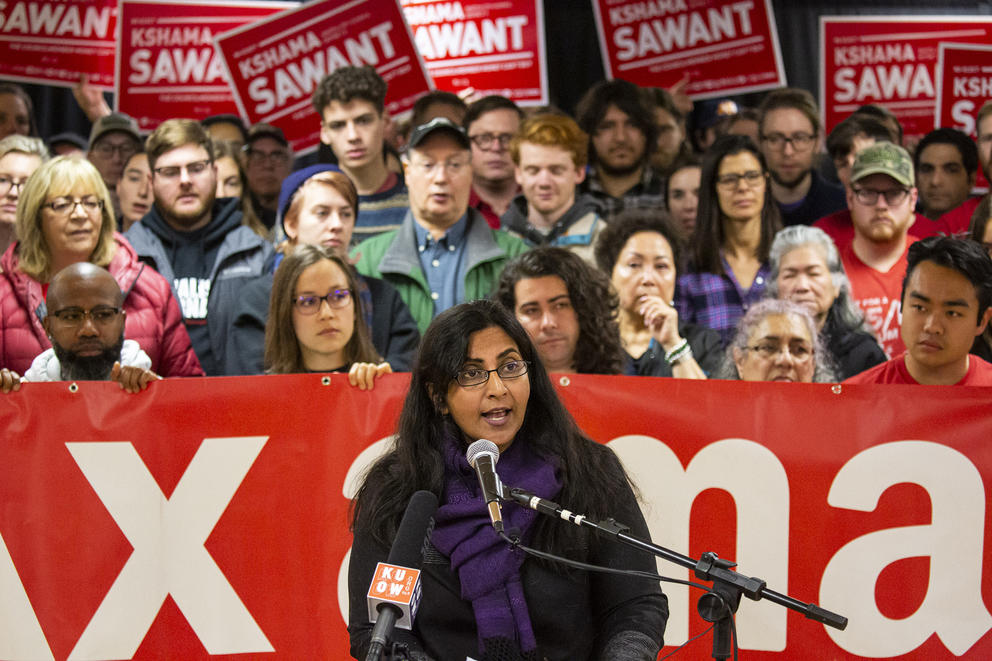“Looks like our movement has won and defended our socialist city council seat for working people against the richest man in the world,” Sawant said.
When she’s sworn in for a third term this January, Sawant will be City Hall’s most senior elected official, a reality few could have imagined when she first declared her candidacy in 2013 on an explicitly Marxist platform.
In Sawant’s view, her reelection was not despite her far-left platform, but because of it. “It is the power of socialist ideas, Marxist ideas, the power of our analysis, strategies, our understanding of class struggle, the historical memory and lessons we bring of the past victories and defeats of our class, the working class,” she said.
For Seattle’s business community, her election represents a reversal of expectations. With just weeks until election day, groups such as the Seattle Metropolitan Chamber of Commerce felt optimistic both that Sawant would be defeated by her opponent Egan Orion and that several candidates would be elected who were more friendly to the chamber’s agenda. While they suspected they’d lose races in Districts 1 and 2, there was an expectation that they could win in most or all of the remaining districts.
But then Amazon wrote a check for $1 million to the chamber-supported political action committee — bringing its total for the election cycle up to $1.5 million — and things began to turn south. In the race for District 3 between Sawant and Orion, polling two weeks before election day had Orion winning by high-single digits, according to a source familiar with the late-tracking polls. But the same polling also showed a strongly negative reaction to the Amazon contribution, which spelled trouble for those most associated with the cash dumps.
The message of bringing accountability to the council — which polled well and which groups working to turn the council toward a more business-friendly slate had pushed hard for months — appears to have been drowned out by a David vs. Goliath narrative between more progressive candidates and Amazon.
Orion himself blamed the Amazon check for tipping the election toward Sawant. “Amazon’s late contribution to [the chamber’s PAC] was our October surprise and a great gift to the Sawant team who previous to that clearly saw this race slipping away from them,” he said in an email.
In the end, five out of seven candidates elected were not backed by the chamber.
Sawant’s reelection will redefine how political watchers view election-night results in Seattle. It’s long been the case that, in Washington’s vote-by-mail system, Seattle ballots counted after election day lean to the left. But Sawant’s 12-point turnaround — from being down 8.5 percentage points on election night to leading by 3.6 points Friday — is unprecedented in recent memory.
In her speech to supporters, Sawant called the results a “mandate for bold, progressive ideas.” She called on her “progressive” colleagues-to-be to work to implement a hard-left agenda. Notably, she explicitly called for reviving the now-famous “head tax” on high-grossing businesses — which, once upon a time, was assumed to be politically toxic.
“The overall city council results were as close to a referendum on the Amazon tax as possible,” she said. “I look forward to working with this new progressive city council to urgently pass a strong tax on the largest businesses in the city, like Amazon.”
Notably, Sawant did not make any gestures toward reaching out to some or her more moderate colleagues — only congratulating Lisa Herbold and Tammy Morales on their elections, and Shaun Scott, who conceded to Alex Pedersen in District 4, on his campaign.
She did, however, provide an opening for her opponents, although one they may be unlikely to take.
“What also made [the election] close was a section of people who have been misled by right-wing ideas, who are correctly angry about homelessness and the massive crisis in our city, but are blaming the wrong people for it,” she said. Sawant encouraged those people to join the socialist “movement.”
The task ahead for the new council is sizable. Seattle’s homeless population remains large and housing prices continue to rise. With the passage of Tim Eyman’s Initiative 976, reducing car tabs to $30, the council will struggle to backfill road maintenance and bus hours.
Poll after poll has shown the Seattle electorate wants a change of direction in city government, especially when it comes to homelessness. What that change looks like, it turns out, may be different than what some expected.






